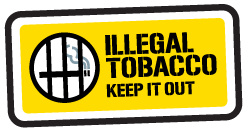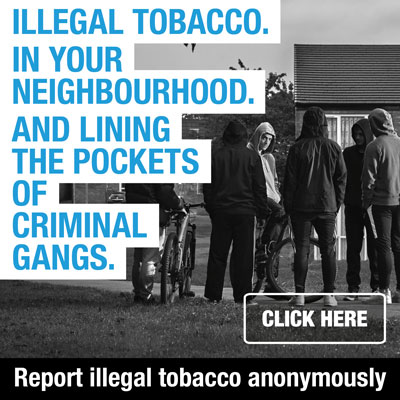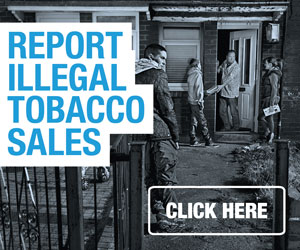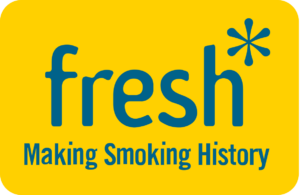‘Keep illegal tobacco out’ this summer
- Over least 1 million illegal cigarettes seized across LA7 region last year
- Health campaigners call for retailer licence to sell any tobacco
People in the North East are being urged to help shut down criminals dealing in illegal tobacco this summer as new figures show that over one million illegal cigarettes were removed from the streets last year.
Enforcement teams are appealing for new information from the public as the Keep It Out campaign launches this week (1).
Around 11% of the total tobacco market in the North East is illegal. And while smoking has halved and the volume of both legal and illegal tobacco have reduced over the last two decades, health campaigners Fresh are urging the government to do more to make smoking history including more action to tackle the illegal tobacco trade and a licensing scheme for any retailer selling tobacco.
Trading standards teams have been active across Tyne and Wear, Northumberland and County Durham seizing 1,030,900 illegal cigarettes and nearly 340kg of illegal hand rolling tobacco in 2021/22 through Operation CeCe, a partnership between National Trading Standards and HMRC to tackle illegal tobacco.
Since 2017, the Keep It Out campaign has resulted in over 2,000 tip offs from within the region and over 9,000 nationally. This information has so far led to Trading Standards seizing illicit tobacco, taking sellers to court, closing down shops, issuing fines and removing alcohol licences.
All people have to do to report anonymously is visit www.keep-it-out.co.uk or telephone 0300 999 0000.
Ailsa Rutter OBE, Director of Fresh and Balance, said: “We know that two thirds of long term smokers will die from smoking, regardless of where they buy their tobacco, how much they pay for it or whether they smoke cigarettes or roll-ups. But cheap, illegal tobacco keeps smokers smoking, gets kids hooked and makes health inequalities even worse, which is the last thing we need right now. Dealers in illegal tobacco are linked to all kinds of criminal activity and really don’t care if local children buy it.
“If we can do more to reduce smoking, we’ll have the biggest impact on reducing the illegal trade. We need to make smoking history once and for all so that we can reduce the misery of preventable smoking-related diseases such as lung cancer or COPD that the Chief Medical Officer has said are caused entirely for the profit of the tobacco industry.
“The Keep It Out campaign has resulted in thousands of pieces of information that has helped trading standards and other enforcement colleagues continue to take illegal tobacco off the streets, and the good news is that we have fewer smokers than even before with only a small minority buying illegal tobacco. No-one wants local criminals profiting from addiction or kids getting hooked which is why so many people are choosing to report where illegal sales are taking place.”
“Increasing tobacco prices is the most effective way of preventing children starting to smoke and to encourage smokers to quit, and what we need now is a new properly funded national tobacco control plan which includes a levy on tobacco manufacturer profits to fund prevention work and enforcement. Shops need a licence to sell alcohol so why not also for tobacco? This would mean any shop selling illegal cigarettes or to children could have this removed, making it easier to reduce the flow of young smokers.”
John McClurey, a former shopkeeper who retired in July and whose own father died from smoking, said: “It’s clear to retailers now that the tobacco market is on the long term decline with more and more smokers quitting to improve their health and to save money, and we’d much rather have customers with more money in their pockets to spend on products that won’t kill them.
“More needs to be done to close down those shops that are selling illegal tobacco – including to children – and it’s a no-brainer than businesses should have a licence to sell tobacco that can be removed if they break the law.”
People who buy cheap tobacco assume it is just duty free but organised crime groups drive the illicit trade, smuggling tobacco internationally and into the UK on a grand scale. National Trading Standards state that the illicit tobacco trade is often part of other criminal activity including drug smuggling and people-trafficking. People who sell illegal tobacco are often the last link in the end of that criminal chain.
Chief Inspector Richard Gentry, of Northumbria Police, said: “We carry out a number of joint operations and activity to take illegal goods off the streets. Some people may think the selling of goods such as illicit tobacco is a victimless crime, but quite often these goods can be a product of organised crime.
“Groups can supply them into the region with the intention of making money, which enables them to then continue to fund illicit activities.
“We are committed to pursuing criminals and protecting our communities as part of Operation Sentinel, which is our collaborative approach to tackling serious and organised crime, and we will continue to work with all our partners to prevent and disrupt these groups.”
A Durham Constabulary spokesperson said: “We regularly work with our partner agencies to reduce the harm caused in our communities by the illegal trade in tobacco.
“Illicit cigarettes can often end up in children’s hands and the profits often find their way to criminals.
“We would urge all members of the public to continue reporting criminal activity in their neighbourhoods so we can take action to prevent it.”
Owen Cleugh, Durham County Council’s public protection manager, said: “We are keen to support the ongoing Keep It Out campaign – selling illegal tobacco is far from being a victimless crime. All tobacco harms users’ health and the health of those around them.
“Illegal tobacco has an adverse impact on our communities, being linked to other organised criminality, as well as on young people, due to its accessibility.
“We encourage residents and businesses to report concerns of illegal tobacco to the Keep It Out hotline. This enables Trading Standards teams to investigate and tackle this criminal activity, protect our children and prevent them taking up smoking at an early stage. If anyone has information on sellers of illicit tobacco or anyone selling tobacco products to people under 18, please contact the hotline on 0300 999 0000.”
Wendy Martin, Director, of National Trading Standards, said: “The trade in illegal tobacco harms local communities. Having removed 13 million illegal cigarettes, 4,300kg of hand rolling tobacco and almost 110kg of shisha products from sale across England and Wales in the first year of Operation CeCe, the partnership between National Trading Standards and HMRC continues to successfully disrupt this illicit trade.”
Nationally, the amount of illicit cigarettes consumed has fallen significantly in recent years: in 2005/06, around 10 billion illicit cigarettes were smoked, compared to 2.5 billion in 2020/21, representing around 9% of the total cigarette market (2). Illegal hand rolling tobacco makes up around 34% of the hand rolling market – and smokers are being advised that roll-ups are no less harmful than cigarettes.
Smoking rates have also nearly halved in the North East from 29% in 2005 to 15% of people currently smoking now. However research in the North East shows around 11% of all tobacco smoked is illegal, and 7 in 10 children aged 14-17 who smoke have been offered and have tried illegal tobacco (3) with “tab houses” and shops the two main sources for children and adults.
Illegal tobacco isn’t just fake tobacco but cheap foreign brands with no legal market in the UK and smuggled genuine tobacco. Globally there is evidence beyond doubt about the role of big tobacco in facilitating smuggling (4).
Illegal tobacco – how big is the market in the North East?
Figures from the 2021 survey of 1878 people in Northumberland, Tyne and Wear and County Durham (including 100 children aged 14-17) found:
More than 7/10 children aged 14-17 who smoke (74%) have been offered illegal tobacco and half (49%) buy it. Houses or “tab houses” are the source for 75% and shops 14% of children’s illegal tobacco purchases
- Around 11% of all tobacco smoked is illegal – largely unchanged since 2015 but lower than 2009 (15%). That means around 128m illegal cigarettes bought in the NE per year with an annual duty loss of around £55m
- 15% of smokers in the sample area (or around 36,000 people) buy illegal tobacco. That’s down from 23% of smokers in 2011. However 61% of buyers now purchase it at least once a week – an increase
- 43% of adult buyers mainly purchase from a house or “tab house”, and 29% from a shop (29%). Street sellers make up 9% of purchases and online only 5%
- 16% of current smokers say they are often offered illegal tobacco
- More than 8/10 buyers of illegal tobacco say it helps them to smoke
What is illegal tobacco?
- Illicit whites – brands which have no legal market in the UK
- Non-UK duty paid – genuine UK brands brought into the country and sold without duty being paid
- Counterfeit – illegally manufactured and made to look like recognised brands
Why is it a problem?
Children: children and young smokers are often targeted by people who sell illegal cigarettes, making it even easier for them to get hooked on smoking. The people making money out of this do not care who they sell to.
Safety: young and vulnerable people are often the ones to visit private addresses to buy cigarettes. It puts them into risky situations with people who might also be selling alcohol, drugs and stolen goods.
Crime: theillegal tobacco trade has strong links with organised crime and criminal gangs, so many of the people smuggling, distributing and selling it are involved in drug dealing, money laundering, people trafficking and even terrorism. Even small time local sellers are at the end of a long criminal chain – selling illegal tobacco is a crime
Health: while both legal and tobacco are equally harmful, illegal tobacco keeps smokers smoking and gets kids hooked on a lethal addiction
ENDS
Notes to Editors:
References
[1] Keep It Out is a major campaign aimed at tackling the illegal tobacco market and launches w/c 1st August 2022 in Northumberland, County Durham and Tyne and Wear.
[2] Tax gaps: Excise (including alcohol, tobacco and oils) – GOV.UK (www.gov.uk)
[3] Illicit Tobacco Tracking Study 1828 interviews – 1055 smokers, 165 illicit tobacco buyers Young person study was among 14-17 year old smokers – 100 interviews – Northumberland, County Durham and Tyne and Wear.
[4] https://tobaccotactics.org/wiki/tobacco-smuggling/
About Keep it Out
Keep It Out is a nationally acclaimed campaign which forms part of a broader approach to reduce smoking through reducing the supply of and demand for illegal tobacco.
As well as appealing for information, the campaign aims to support work in tackling illegal tobacco and drive information for local trading standards teams, with local printed materials in a number of languages.
Fresh
Fresh is the UK’s first dedicated regional programme for tobacco control. It was set up in 2005 to tackle the high toll of death and disease caused by smoking. Since then the North East has achieved the greatest decline in adult smoking of any English region-with an overall 47% reduction in the number of adult smokers from 2005 to 2019.
Fresh is currently funded by councils in the North East.
Fresh has received a number of awards including CMO Public Health Award (Gold Medal); Irish Cancer Society Charles Cully Memorial Medal, NHS Leadership Award, WHO World No Tobacco Day Award.
For more information go to www.freshne.com or contact:
Sarah Jeffery
Senior PR and Content Account Manager
Gardiner Richardson
sarahj@gardiner-richardson.com
07790 339059
Ellie Lyall
PR and Content Account Manager
Gardiner Richardson
elliel@gardiner-richardson.com
07852 317337




